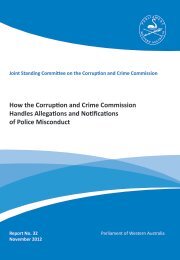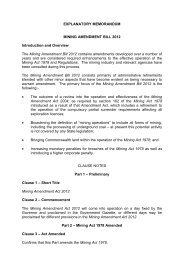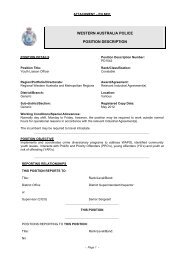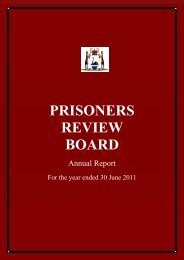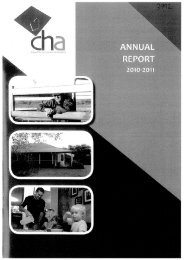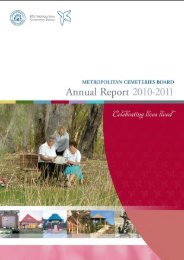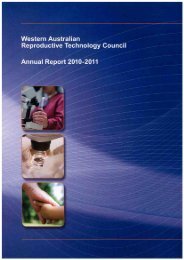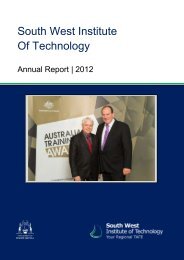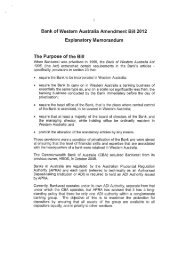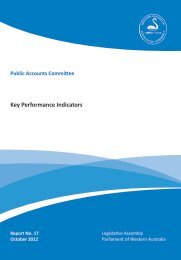Tabled Paper - Parliament of Western Australia
Tabled Paper - Parliament of Western Australia
Tabled Paper - Parliament of Western Australia
You also want an ePaper? Increase the reach of your titles
YUMPU automatically turns print PDFs into web optimized ePapers that Google loves.
Sometimes, the Committee may direct that further inquiries be made or defer<br />
investigation pending the outcome <strong>of</strong> litigation.<br />
Complaints resolved by Rapid Resolution Team<br />
Case Study 1<br />
Client informed by a firm it could no longer represent him because it anticipated<br />
receiving instructions from a bank client in a related matter<br />
Tom, a builder, instructed a litigation partner in a large city firm to represent him in an<br />
arbitration arising out <strong>of</strong> non payment <strong>of</strong> monies for the construction <strong>of</strong> houses on two<br />
properties owned by the defendant. The action was successful and the firm was instructed<br />
to prepare a bill <strong>of</strong> costs for taxation to recover party/party costs. In the meantime,<br />
another partner in the firm became aware that the firm may receive instructions to act for<br />
one <strong>of</strong> its banking clients to take mortgagee proceedings in respect <strong>of</strong> the same<br />
properties. The firm informed Tom that it could no longer act for him.<br />
Tom contacted the Committee and a member <strong>of</strong> the Rapid Resolution team spoke to the<br />
litigation partner and asked him to consider the Legal Pr<strong>of</strong>ession Conduct Rules concerning<br />
conflicts <strong>of</strong> interest and explained that the view <strong>of</strong> the Committee was that it was not<br />
reasonable to terminate Tom's retainer in the circumstances. After some further<br />
discussion with the partner and correspondence with the Managing partner <strong>of</strong> the firm,<br />
the issue was resolved on the basis <strong>of</strong> the firm agreeing to continue to act for Tom.<br />
Case Study 2<br />
Party complaining that the solicitor for the opposing party in Family Court proceedings<br />
sent correspondence containing language which was highly emotive<br />
Vanessa was involved in extensive litigation in the Family Court which had been ongoing<br />
for several years concerning property and child related issues. Vanessa contacted the<br />
Committee after receiving a very lengthy letter from her former husband's solicitor which<br />
included personal observations about Vanessa relating to her personality, which were very<br />
emotive and possibly insulting. Some <strong>of</strong> the comments referred to the client's beliefs and<br />
others were the practitioner's own observations.<br />
A legal <strong>of</strong>ficer <strong>of</strong> the Rapid Resolution team contacted the practitioner and discussed with<br />
him the need to be careful in communications and not to descend into using language<br />
which could be construed as emotional, rude or indeed insulting and explained that in<br />
pursuing a client's interests he needed to avoid being his client's "mouthpiece". The<br />
practitioner was also asked to consider the Law Society's Ethical and Practice Guidelines<br />
2010 in this regard. The practitioner agreed to withdraw the letter and replaced it with<br />
another letter deleting the words in issue.



